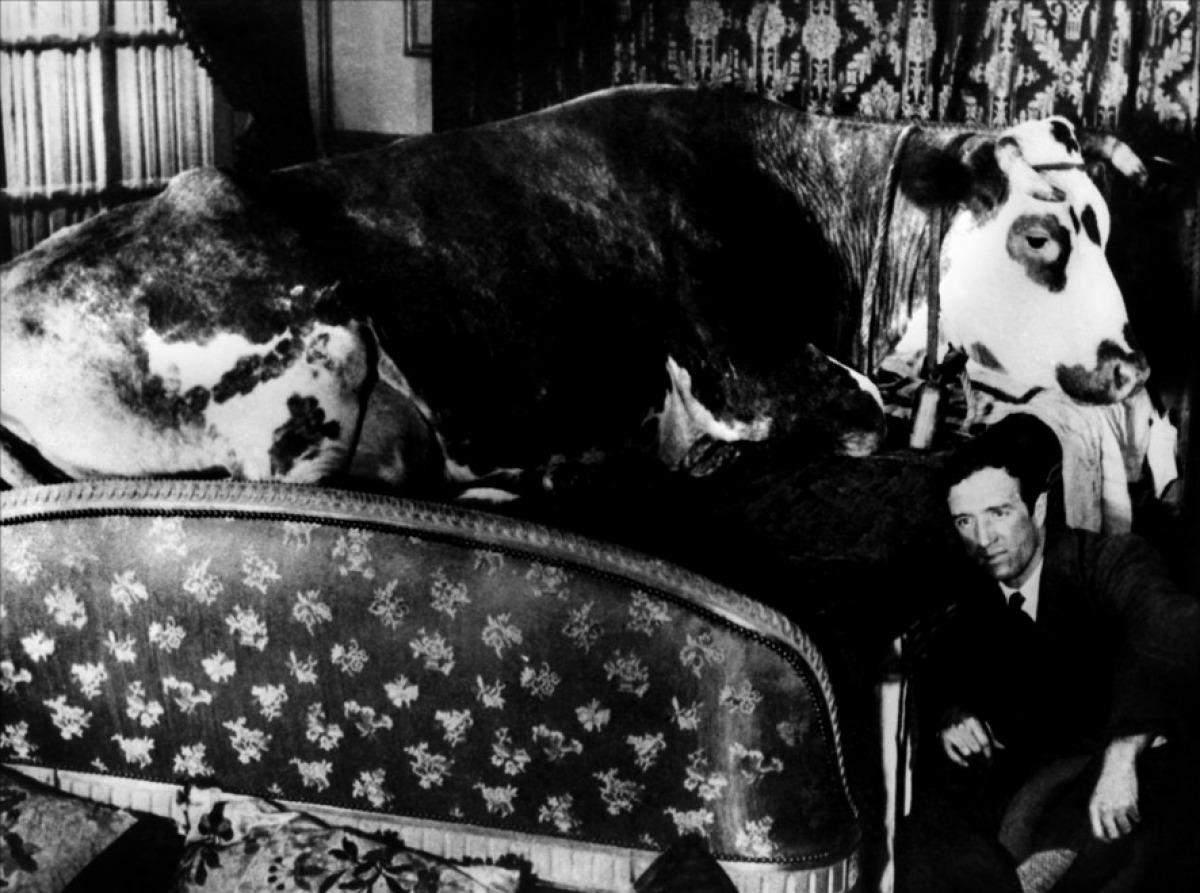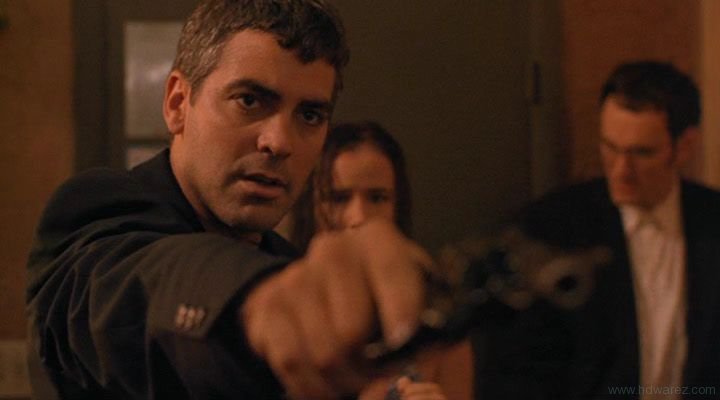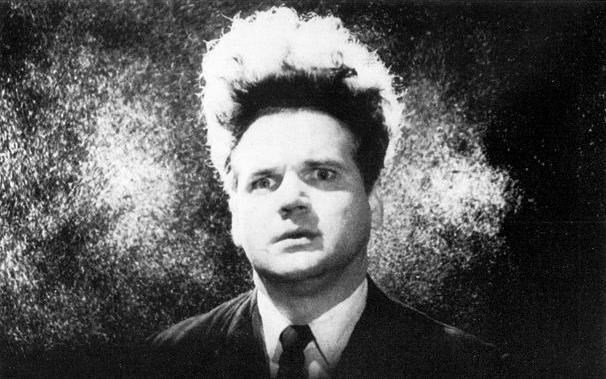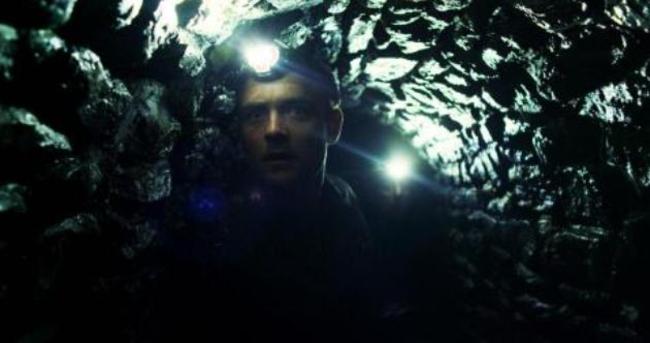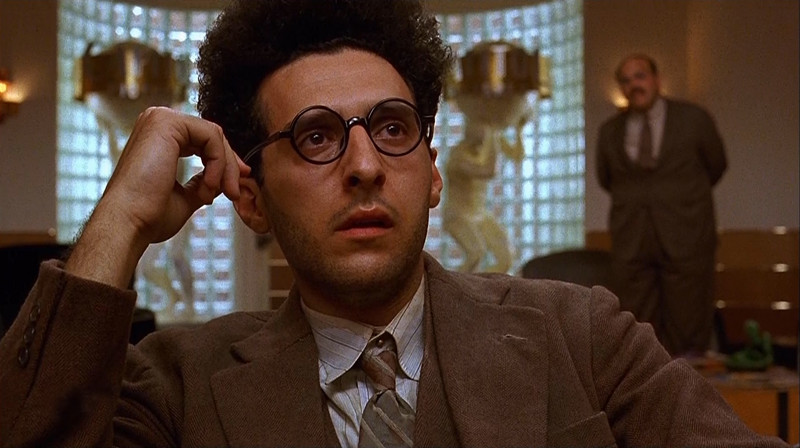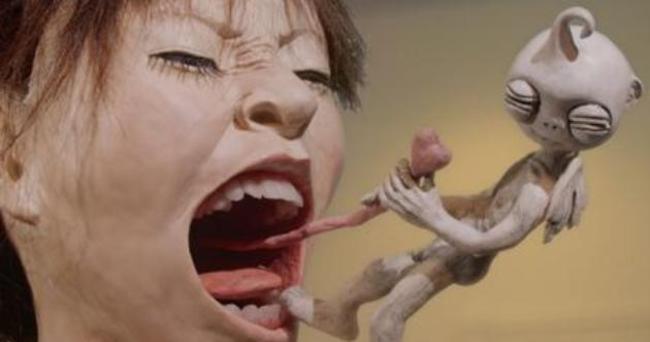7. L’Age D’or (1930)
Andrew Tudor once wrote that films can be defined on their intentions, e.g. a comedy strives to make you laugh, whereas a horror wants to scare you. If that theory was applied to this film, the audience at hand will not know whether to laugh, cry, gasp, vomit, order a pizza or depart for another country – even an audience watching the film eighty years after its release. Its intentions are undoubtedly to shock and confuse which is exactly what effect it had on the French fascists of its day, who promptly banned it for fifty years!
undoubtedly belongs to surrealism – that amorphous body of work in which literally ANYTHING can happen. Including this film on the list could be a questionable choice as film genre did not play as important a role in defining film then as it does today – but it is almost certain that Dali and Buñuel did not care how people described the film, as long as it offended them.
From a cow in a bed, to fingers coming and going, to kicking Violas, to it being suggested that Jesus Christ took part in the depraved debauchery of Marquis De Sade’s ‘120 Days Of Sodom’, L’AgeD’or is probably the closest that someone has made it to capturing a hallucinogenic influenced dream on film.
What it is usually pigeonholed into – “Surrealist drama” or “Romantic comedy (!)”
6. From Dusk Till Dawn (1996)
Beginning as a dysfunctional western-tinged road movie with two unstable criminals in the lead roles. Ending as a vampire splatter-fest without as much as a warning or inkling as to where the film was going. In From Dusk Till Dawn, Director Robert Rodriguez and Writer/Co-star Quentin Tarantino perform an inexplicable genre switcheroo halfway through the proceedings rendering it almost impossible to fit into a genre, never mind a hybrid or sub-genre.
The film incorporates both of the semantic elements and syntactic elements of the ‘western crime thriller’ and ‘vampire-horror’ genres as it exhibits the Mexican border, motels, safehousesand the club/vampire hide-out as it also features the themes of kidnapping and armed-robbery with the excessive gore and vampires.
From Dusk Till Dawn stylistically cuts itself in half, and strangely, it inspires some cinematically profound queries such as – how does a film be categorized that shuffles genres so distinctly – and what amount of themes and characteristics of a particular genre justify the labelling of that genre being attached to a film? Does genre even matter to certain films?! Certainly not this one.
What it is usually pigeonholed into – “Action Horror” or “Crime comedy”
5. Eraserhead (1977)
Many of David Lynch’s later films arguably belong to the ‘neo-noir’ corpus, but even so, they could still be considered somewhat unclassifiable by many of their bewildered spectators. Eraserhead, on the other hand, is so abstract that it still remains way off the conventional genre spectrum.
Eraserhead is essentially a film that focuses on the fears and anxiety of parenthood represented as a monochromatic, surrealistic nightmare. The industrial drone score could match the aesthetics, pace and tone of no other film and is probably half of what makes watching Eraserhead such an unforgettably unique experience.
An unsettling, morbid but pitch-black comic classic. Watch out for menstruating chicken dinners and those other-world-concealing radiators.
What it is usually pigeonholed into – “Science Fiction drama” or “Surrealist horror”
4. Kill List (2011)
Ben Wheatley directedthis low-budget and gritty piece of British Cinema which made people stand up and take note of him, despite the majority of them not fully figuring out Kill List on first viewing. This gritty film fuses kitchen-sink-realism, a taut hitman premise, specs of deadpan humour and cult-themed horror to form a disorientating, hard-hitting and uniquely disturbing thriller.
The violence on screen is absolutely unflinching and Neil Maskell’s portrayal of Jay as the volatile central character is genuinely unnerving – he is someone who you absolutely would not want to spend time alone with. Yet, he also has the ability of conveying some dark laughs which altogether adds to the films deliberate tonal confliction.
Overall, Kill List is one of the most original films that have landed in recent times, and one that proves that films with such mind-bending impact are still being made.
What it is usually pigeonholed into – “Crime drama” or “Horror thriller”
3. Performance (1970)
Whether it be seen as a psychological British Gangster thriller or simply just a drug odyssey-cum-nauseating mess with Mick Jagger breaching the proceedings, Performance is totally unique as it is aggravatingly oblique.
Beginning in the East End of London as an enigmatically edited but more-or-less conventional Gangster narrative, the film follows Chas (James Fox), who after committing an unapproved murder, is on the run from his superiors as he crosses to the West End (and seemingly into another film altogether). This is where fantasy and reality seem to be spliced together, or just completely dissipate, and the narrative meanders off into a world purely unto itself – involving copious amounts of drug-use, cross-dressing, symbolic experimentation with mirrors during sex and dual identities. There is also what is essentially the music video for Jagger’s ‘Memo For Turner’ thrown in for good measure – easily the most bizarre segment of the film.
Legend has it, one of Warner’s Studio Executive’s wives vomited during the premiere; a perfectly reasonable response when you’re expecting some happy-go-lucky A Hard Day’s Night-esque feature and cuing Performance to be shelved for two years forthwith.
What it is usually pigeonholed into – “Crime film” or “Art-house thriller”
2. Barton Fink (1991)
Like Lynch, many of the Coen brothers’ films do not easily befit a particular style of films despite being arguably a lot more accessible. Barton Fink, however, is undoubtedly the pinnacle of their genre-mashing. It is a film that spreads so many styles and themes so equally over its near two hour duration that genre barely applies.
Barton Fink takes on the typically oddball Coen’s comedy with surrealism, mystery, film noir, glaring Hollywood satire and also overt hints towards horror with those slimy, claustrophobic rooms and the tongue-in-cheek but no less shocking inferno ending. Even the Coen’s have themselves in Roland Bergman’s book about their work, stated that the film “does not belong to any genre.”
If you wanted to get an idea of how stylistically conflicted this film is in terms of genre, just check out the schizophrenic theatrical trailer!
What it is usually pigeonholed into – “Drama” or “Black Comedy”
1. The Happiness Of The Katakuris (2001)
In 2001, Takashi Miike directed The Happiness Of The Katakuris – a film he made seemingly with the ambition of it not ever belonging to any particular body of films that has been conceived before it by taking bits and pieces of just about any genre he could think of, putting them in a blender and then throwing the creation at cinema screens to see if it stuck. It did.
Essentially a deliberately excessive remake of Kim Jee-Woon’s The Quiet Family – Happiness focuses on a Japanese family that own a small hotel in a desolate area near Mount Fuji whose paltry amount of guests promptly die on arrival leaving the family to deal with the remains.
The film’s overtly horror narrative and subject matter is dealt with in an improbable and exaggerated manner that brings in surrealist claymation, highly comedic situations, zombies, and even musical and karaoke sequences. There is also a Japanese Pilot called Richard – utter genius! Films such as The Happiness Of TheKatakuris practically defy cinema itself, let alone genre.
Author Bio: Liam Hathaway has a lifelong passion of watching and reading about any/every sort of film which has lead him to be a Film Studies student at Sheffield Hallam University. His favourite directors at the moment are John Carpenter, Ben Wheatley, Werner Herzog and Martin Scorsese.
